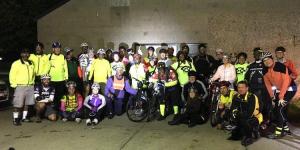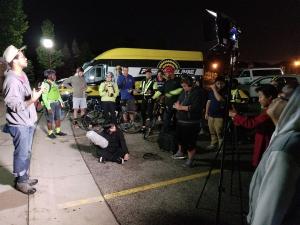ST.PAUL, MN, UNITED STATES, March 31, 2025 /EINPresswire.com/ -- Back in 2017, Asian Media Access proudly supported the Dusk2Dawn “Bicycling Through History” event, organized together with the Major Taylor Bicycling Club of Minnesota, which promotes cycling among all. This unique night ride served as more than just a cycling event - it was an innovative approach to addressing urban development challenges and advocating for healthier lifestyles. By guiding participants through historically significant sites, the event shed light on the lasting impacts of car- and suburb focused growth on urban communities. Additionally, Dusk2Dawn reinforced the idea that physical activity and healthy living are not limited to daylight hours, encouraging participants to embrace movement as an integral part of their daily lives, regardless of the time.
The Night Ride of Culture and History
AMA event took riders on a 50-mile night journey through Minneapolis and St. Paul. More than just a ride, it was a powerful blend of cycling, history of inequality urban development, and culture, highlighting significant African American displacements and long lasting traumas. Key stops included Penumbra Theatre, the last remaining African American theater in the U.S., the Rondo Neighborhood, where participants reflected on the impact of Interstate 94 destroyed the striving 1960s black neighborhood, and the Green Line Victoria Street Station, where discussions centered on community equality for transit oriented developments. The event was a unique and educational experience, inspiring participants to further explore these important historical sites and its traumatic impacts
Beyond the Ride: a Powerful Turnout for Reflection and Action
The event successfully blended cycling, history of displacements, and community engagement, creating a truly impactful experience. Our 2017 event brought together 32 riders and 7 AMA youth to explore neighborhoods, visited key landmarks, and engaged in meaningful discussions. Community leaders, including Darius Gray, shared insights on proposed reparations aimed at reconnecting historically divided communities. As noted by Daniel Choma, the event was not only educational and inspiring but also emphasized the importance of inclusive Transit Oriented Development (TOD), ensuring that all cyclists - regardless of background - have a voice in shaping their urban environment.
Strengthening Community Connectivity Through Walk and Bike Audits
With such success and powerful tools, AMA plans to leverage - walk and bike audits for assessment and advocacy - again and at the former St. Paul Sears site to enhance community connectivity while addressing the injustices of public transportation policies that disproportionately impact BIPOC communities. As the weather warms, we will engage residents in evaluating walkability, bike access, and transit connectivity in key areas, including the former Sears parking lot and surrounding neighborhoods across Highway 94. These audits will not only acknowledge the historical harms inflicted on the Frogtown and Rondo communities but also help envision a more pedestrian- and bike-friendly future—one with improved food access, safer routes, and stronger neighborhood connections.
A walk audit at the St. Paul Sears site is essential for identifying barriers to foot and bike traffic, including safety concerns (e.g., high-traffic roads, inadequate crosswalks), accessibility challenges (e.g., poor sidewalk conditions, missing curb cuts), and gaps in connectivity (e.g., lack of bike lanes). It will also assess comfort factors like lighting and seating while informing redevelopment plans to create a more walkable, inclusive space. Critically, the audit will examine access to exercise facilities (such as parks and safe walking routes) and food sources (including grocery stores and food deserts), ensuring that equity and community health remain central to the planning process.
Additionally, in collaboration with local partners, AMA will organize a bicycle ride audit along the Blue Line Extension corridor, from North Minneapolis to Brooklyn Park. This hands-on experience will allow participants to evaluate the transit route firsthand, providing vital feedback on safety and connectivity to shape future station designs.
These efforts reflect AMA’s enduring commitment to using creative, community-driven approaches to advocate for safer, greener, and more accessible spaces—centering the voices of BIPOC communities in the fight for equitable urban development. We would like to welcome more partners to join our effort, please connect with us at amamedia@amamedia.org or 612-376-7715.
The Night Ride of Culture and History
AMA event took riders on a 50-mile night journey through Minneapolis and St. Paul. More than just a ride, it was a powerful blend of cycling, history of inequality urban development, and culture, highlighting significant African American displacements and long lasting traumas. Key stops included Penumbra Theatre, the last remaining African American theater in the U.S., the Rondo Neighborhood, where participants reflected on the impact of Interstate 94 destroyed the striving 1960s black neighborhood, and the Green Line Victoria Street Station, where discussions centered on community equality for transit oriented developments. The event was a unique and educational experience, inspiring participants to further explore these important historical sites and its traumatic impacts
Beyond the Ride: a Powerful Turnout for Reflection and Action
The event successfully blended cycling, history of displacements, and community engagement, creating a truly impactful experience. Our 2017 event brought together 32 riders and 7 AMA youth to explore neighborhoods, visited key landmarks, and engaged in meaningful discussions. Community leaders, including Darius Gray, shared insights on proposed reparations aimed at reconnecting historically divided communities. As noted by Daniel Choma, the event was not only educational and inspiring but also emphasized the importance of inclusive Transit Oriented Development (TOD), ensuring that all cyclists - regardless of background - have a voice in shaping their urban environment.
Strengthening Community Connectivity Through Walk and Bike Audits
With such success and powerful tools, AMA plans to leverage - walk and bike audits for assessment and advocacy - again and at the former St. Paul Sears site to enhance community connectivity while addressing the injustices of public transportation policies that disproportionately impact BIPOC communities. As the weather warms, we will engage residents in evaluating walkability, bike access, and transit connectivity in key areas, including the former Sears parking lot and surrounding neighborhoods across Highway 94. These audits will not only acknowledge the historical harms inflicted on the Frogtown and Rondo communities but also help envision a more pedestrian- and bike-friendly future—one with improved food access, safer routes, and stronger neighborhood connections.
A walk audit at the St. Paul Sears site is essential for identifying barriers to foot and bike traffic, including safety concerns (e.g., high-traffic roads, inadequate crosswalks), accessibility challenges (e.g., poor sidewalk conditions, missing curb cuts), and gaps in connectivity (e.g., lack of bike lanes). It will also assess comfort factors like lighting and seating while informing redevelopment plans to create a more walkable, inclusive space. Critically, the audit will examine access to exercise facilities (such as parks and safe walking routes) and food sources (including grocery stores and food deserts), ensuring that equity and community health remain central to the planning process.
Additionally, in collaboration with local partners, AMA will organize a bicycle ride audit along the Blue Line Extension corridor, from North Minneapolis to Brooklyn Park. This hands-on experience will allow participants to evaluate the transit route firsthand, providing vital feedback on safety and connectivity to shape future station designs.
These efforts reflect AMA’s enduring commitment to using creative, community-driven approaches to advocate for safer, greener, and more accessible spaces—centering the voices of BIPOC communities in the fight for equitable urban development. We would like to welcome more partners to join our effort, please connect with us at amamedia@amamedia.org or 612-376-7715.
Ange Hwang
Asian Media Access
+1 612-376-7715
email us here
Visit us on social media:
Facebook
X
Instagram
YouTube
Legal Disclaimer:
EIN Presswire provides this news content "as is" without warranty of any kind. We do not accept any responsibility or liability for the accuracy, content, images, videos, licenses, completeness, legality, or reliability of the information contained in this article. If you have any complaints or copyright issues related to this article, kindly contact the author above.



